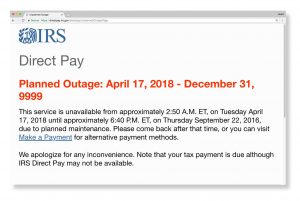This past Wednesday was the last day for Americans to file and pay their taxes without being penalized by the IRS. Of course, the original deadline was supposed to be Tuesday, April 17th, but the department’s website crashed early that morning, forcing the IRS to move the deadline to Wednesday. However, the true bureaucratic nature of a large government agency like IRS was put on display, as those attempting to use the site were shown this error message.
Not only does the “planned outage” promise to be back in time for New Year’s Eve 10000, but the additional text below contradicts that date, telling users the site will be available on Thursday, September 22, 2016. And while we are currently in the year 2018, making both of those dates completely unhelpful, the site also warned taxpayers that their taxes are still due, even if there is no way to pay on the site.
But blunder aside, April 17th, the original deadline planned for this year, is also not the date typically associated with tax day. Historically, April 15th has been the day that Americans dread all year long. And while most of us were relieved at the prospect of having a few extra days to worry about getting our taxes filed, few of us bothered to ask why Tax Day had been moved.
Switching Tax Day from its typical April 15th date is not completely without precedent. When April 15thfalls on a weekend, the federal government will typically move it to the following business day. This year, tax day fell on a Sunday. But you will notice that that would have pushed this year’s deadline to Monday, April 16th, not the following day.
However, if you work for the Internal Revenue Service, which just happens to be located in our nation’s capital, the 16th of April is a holiday. During Abraham Lincoln’s presidency, April 16th was instituted as Emancipation Day in the District of Columbia. Recognized only within the geographical limits of Washington, D.C., government employees working in the district are given a paid day off.
Not wanting to miss out on this holiday that literally no one else in the country celebrates, IRS employees took the day off. Thus, when looked at objectively, the federal government extended the tax submission deadline specifically so it could take a paid day off.
Recently, it was reported that the IRS has only been able to answer a very small portion of the calls it receives from taxpayers with tax-related questions. That means that many Americans have been unable to get the information they need from the IRS in order to file their tax returns. It would be nice to think that the federal government had decided to extend the tax deadline as a favor to the American people, or even as a way of apologizing for the bureaucratic hurdles the taxpayers had to climb over just to reach an IRS representative, but that is not the case.
In fact, both Maine and Massachusetts celebrate, “Patriots’ Day” every April 18th. Though you might think that residents of either of these states would also have an additional day to submit their taxes, you would be mistaken. Since both states have residents who are paying taxes to other states, who do not recognize Patriots’ Day, Maine and Massachusetts residents are still required to meet the new April 18th deadline.
Not that anyone should really be shocked by the government’s hypocrisy in regards to Patriots Day, nor should Americans be shocked that the federal government jumped at the chance of taking a paid day off.
As Henry David Thoreau once said, “That government is best which governs least.”














